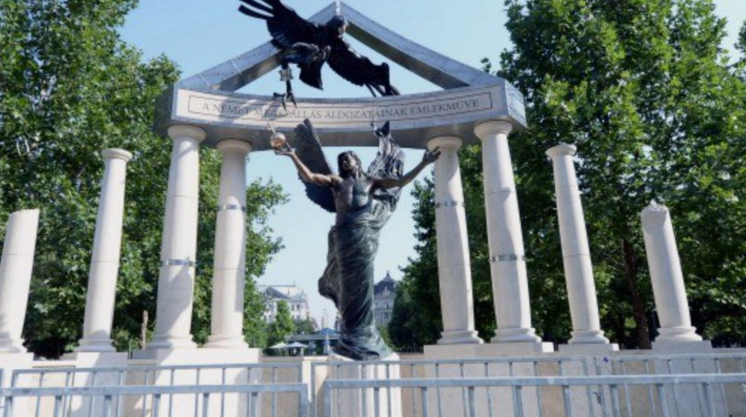Today officially marks the 70th anniversary of the Hungarian holocaust. A few Hungarian government officials will put flowers by the Danube, where hundreds of Jews were tied together and ordered to take off their shoes. Only the first and last in the line were shot, but the rest, who were lashed to them, died by drowning as they were all pushed into the river. That way the Hungarian Arrow Cross government could save bullets.
Last night I watched as ordinary Hungarians, old and young, Jewish, Christian, dark, light, men, women, and children, worked nearby to stop the construction of a new statue in my Budapest neighborhood. This monument is a personal project of Prime Minister Viktor Orban, to blame Germany for the 560,000 Jewish, Roma and other Hungarian Holocaust murders during World War II. The international community has protested this statue, which denies that Hungary was Hitler’s willing anti-Semitic ally throughout most of the war. This memorial aims to airbrush away the fact that it was Hungarians, not Germans, who carried out most of the official roundups and murders here, after decades of laws discriminating against Jews. https://www.youtube.com/watch?v=XpFHbKbCCzc
Much has been made of the far-right party Jobbik, which did gain more than 20% of the votes in the April 6 election. But they are the only effective opposition party these days, so many of their voters came to them despite their neo-Nazi ideology. I am more worried right now about Prime Minister Orban’s victorious Fidesz party. They have adopted many of the worst aspects of Jobbik, under the guise of a “center-right” approach, and they are playing with fire.
The government delayed the statue project briefly before the April 6 election, but Orban began construction a few hours after his victory was assured. If ever anyone had the capacity to be magnanimous, it is someone who has just won re-election with a contrived two-thirds supermajority. But apparently Orban is not in a generous mood. He remains unconcerned that he is creating a “soft” form of Holocaust denial in the heart of the bloodlands where it occurred. These unhappy historical facts get in the way of his signature effort to help Hungarians be proud of themselves. In Orban’s world view, whatever goes wrong here has been the fault of the Turks, the Germans, the Russians, and now, the liberal West. Orban loves to beat up the EU, which gave Hungary 24 billion more Euros in support from 2007-2013 than Hungary provided back—and the USA. Hungarians, seeing this narrative every day in their media, believe Europeans and Americans are actively plotting to deny them their birthright and their pride.
It is part of an ugly pattern that everyone here–especially here!–should resist. It was this same approach that German’s Hitler and Hungary’s Admiral Horthy used, to blame conspirators for their nations’ ills. While Germany has moved on, being exceptionally clear about acknowledging the mistakes of its past, today’s Hungary has done the opposite.
It is such a waste. Hungary, which boasts a traditionally well-educated and hard-working population, could yet become a strong and admired country. Its geographical and political location at the crossroads of East and West could make Viktor Orban a world leader, brokering needed peace and economic agreements among Iran, Russia, and the West. Instead Hungary has lost the respect of international businesses and governments who are looking for a sound economy, based on the rule of law and relatively honest work. Orban nationalizes and blames others for Hungary’s bad reputation in the West.
Viktor Orban, who once was a dissident against the Communists in 1989, and won a scholarship paid for by George Soros, could have won his recent election fairly, because many people here like him, and the opposition was such a mess. But international observers have concluded that his Fidesz party was able to capture the “supermajority” with only 44% of the popular vote because they changed the election laws to favor their districts, their candidates, media access, new diaspora absentee voters, and much more. http://krugman.blogs.nytimes.com/2014/02/28/hungary-an-election-in-question-part-5/
One couldn’t even find posters for the opposition candidates, whose television spots were also effectively barred from the airwaves before the April 6 vote. What we saw everywhere was prime minister’s ubiquitous portrait, with the phrase: “Viktor Orban, Hungary’s Prime Minister,” and another poster depicting the opposition figures as clowns. I even got a text message on my cell phone on election day, reminding me to vote for Orban. That would have been illegal, of course. As a foreigner, I am not registered to vote here. The government apparently seized the phone companies’ customer lists to push out its partisan message. Opposition candidates did not have that option.
The police today are shooting video of every person dismantling each plank and metal piece of the statue. Once they are arrested or subdued, it is likely that in a matter of days, the statue will be rushed to completion. This huge project will dominate Szabadsag Ter, “Freedom Square,” home of the US Embassy (where Cardinal Mindszenty found asylum from the Soviets after 1956), the Soviet obelisk (thanking the Russians for defeating the Germans in 1945), dwarfing a lifesize Ronald Reagan statue (thanking the USA for helping to defeat Communism) across the park. The dismantlers will gain nothing for this act of rebellion, but their souls. It is particularly outrageous that the monument’s construction is undertaken during not only Passover and Easter week, but the 70th anniversary week officially remembering the Hungarian Holocaust.
While they have little gain, these protesting Hungarians have a lot to lose. The Fidesz government now seems to have virtually unchecked power. To be sure, Hungary is in the European Union, but only barely. It is moving farther and farther away from democracy and a market economy. I could be depressed, watching this regressive behavior, the predictable election results and the mass media here, which are afraid or unwilling to tell the truth. But instead I am impressed, deeply impressed, with these other people who are taking real personal risks in a state that is creating a new era of intolerance and autocracy. They don’t know what the government will do to them, but they are willing to take their chances.
We foreigners are watching, and will bear full and loud witness to what happens next.

